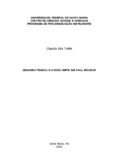| dc.creator | Tiellet, Claudia Aita | |
| dc.date.accessioned | 2021-12-15T11:17:06Z | |
| dc.date.available | 2021-12-15T11:17:06Z | |
| dc.date.issued | 2020-03-31 | |
| dc.identifier.uri | http://repositorio.ufsm.br/handle/1/23314 | |
| dc.description.abstract | The present research starts from the observation of the philosopher Paul Ricoeur, who, like
two major philosophical ethical traditions, a chain of teleology in the wake of Aristotle and a
chain of deontology in Emmanuel Kant, treats the second person of ethics in an obliterated
way. The chain of teleological ethics sees civic virtue or humanity only in friendship (philia)
between men, free and equal. Interpersonal relationships are only possible or reasonable if
those involved are predominantly male, from the same and higher socioeconomic class. The
current of deontological morality, in turn, brings with it the modern ideal of an autonomous
subject that constantly clashes with the demand for reciprocity in interpersonal relationships.
Both traditions, therefore, do not overcome the initial dissymmetry, based on the theories of
deposition of the other and cultivate inertia in the face of so much violence. Thinking about
the suffering of the second person immersed in these situations of inequality, the French
philosopher points out a way out, arising from the articulation and complementarity between
ethics, from the notion of solicitude, and moral, from the category of respect. Thus, we will
defend that Ricoeur corrects the deficiencies in the treatment of the second person of ethics,
in accordance with the premises of solicitude and respect and the search for articulation
between ethics and morals. Our proposal will be better understood from the analysis of the
way in which our philosopher operates deliberation, or moral judgment in a singular situation,
through the examination of limit cases. | eng |
| dc.description.sponsorship | Coordenação de Aperfeiçoamento de Pessoal de Nível Superior - CAPES | por |
| dc.language | por | por |
| dc.publisher | Universidade Federal de Santa Maria | por |
| dc.rights | Attribution-NonCommercial-NoDerivatives 4.0 International | * |
| dc.rights.uri | http://creativecommons.org/licenses/by-nc-nd/4.0/ | * |
| dc.subject | Ética | por |
| dc.subject | Moral | por |
| dc.subject | Aristóteles | por |
| dc.subject | Kant | por |
| dc.subject | Segunda pessoa | por |
| dc.subject | Solicitude | por |
| dc.subject | Respeito | por |
| dc.subject | Casos-limite | por |
| dc.subject | Éthics | eng |
| dc.subject | Aristotle | eng |
| dc.subject | Second person | eng |
| dc.subject | Solicitude | eng |
| dc.subject | Respect | eng |
| dc.subject | Limit cases | eng |
| dc.title | Segunda pessoa e casos-limite em Paul Ricoeur | por |
| dc.type | Tese | por |
| dc.description.resumo | A presente pesquisa parte da constatação do filósofo Paul Ricoeur, de que as duas maiores
tradições da ética filosófica, a corrente da teleologia na esteira de Aristóteles e a corrente da
deontologia em Emmanuel Kant, tratam a segunda pessoa da ética de forma obliterada. A
corrente da ética teleológica vê virtude cívica ou humanidade apenas na amizade (philia)
entre homens, livres e iguais. As relações interpessoais só são possíveis ou razoáveis se os
envolvidos forem predominantemente do sexo masculino, de uma mesma e mais elevada
classe socioeconômica. A corrente da moral deontológica, por sua vez, traz consigo o ideal
moderno de sujeito autônomo que se choca constantemente com a exigência de
reciprocidade na relação interpessoal. Ambas as tradições, destarte, não superam a
dissimetria inicial, calcada nas teorias de deposição do outro e cultivam a inércia diante de
tanta violência. Pensando acerca do sofrimento da segunda pessoa imersa nessas
situações de desigualdade, o filósofo francês aponta uma saída, advinda da articulação e
complementariedade entre ética, a partir da noção de solicitude, e moral, a partir da
categoria do respeito. Desse modo, defenderemos que Ricoeur corrige as deficiências do
tratamento da segunda pessoa da ética, em conformidade com as premissas da solicitude e
do respeito e a busca de articulação entre ética e moral. Nossa proposta será mais bem
compreendida a partir da análise da maneira pela qual nosso filósofo opera a deliberação,
ou o juízo moral em situação singular, mediante o exame de casos-limite. | por |
| dc.contributor.advisor1 | Rossatto, Noeli Dutra | |
| dc.contributor.advisor1Lattes | http://lattes.cnpq.br/2947312243186882 | por |
| dc.contributor.referee1 | Moratalla, Tomás Domingo | |
| dc.contributor.referee2 | Krassuski, Jair Antônio | |
| dc.contributor.referee3 | Gubert, Paulo Gilberto | |
| dc.contributor.referee4 | Costa, Paulo Sérgio de Jesus | |
| dc.creator.Lattes | http://lattes.cnpq.br/8406680811474298 | por |
| dc.publisher.country | Brasil | por |
| dc.publisher.department | Filosofia | por |
| dc.publisher.initials | UFSM | por |
| dc.publisher.program | Programa de Pós-Graduação em Filosofia | por |
| dc.subject.cnpq | CNPQ::CIENCIAS HUMANAS::FILOSOFIA | por |
| dc.publisher.unidade | Centro de Ciências Sociais e Humanas | por |



